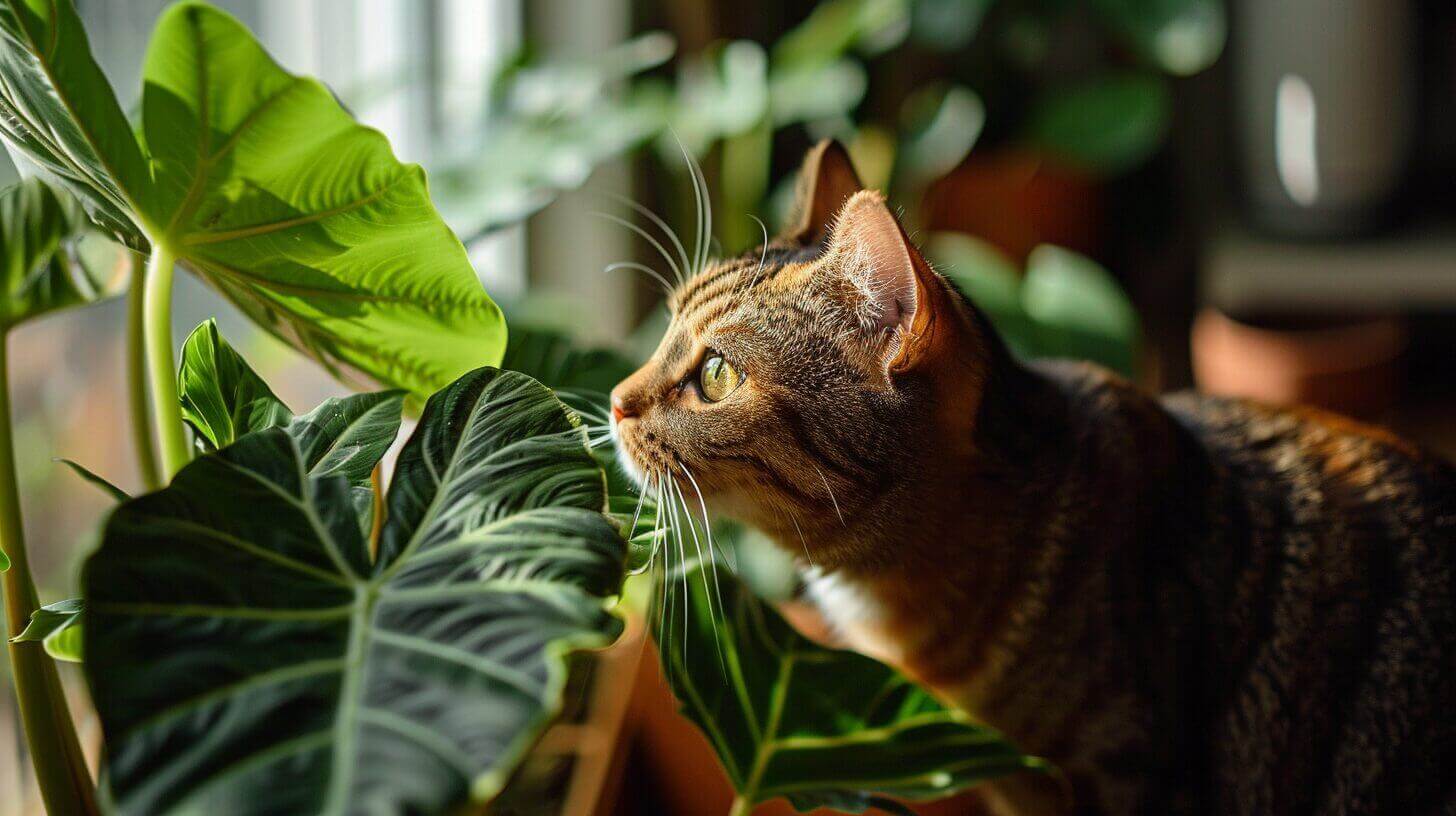Is Elephant Ears Poisonous To Dogs & Cats? How Long Does Elephant Ear Poisoning Last?
As a pet owner, it is important to be aware of potential hazards that can pose a threat to our four-legged friends. One such danger is the toxic nature of the elephant ear plant. Also known as colocasia, alocasia, xanthosoma, taro, caladium, and malanga, this ornamental plant contains calcium oxalate crystals that can cause harm to pets when ingested.
When a pet chews on the elephant ear plant, these crystal-like substances are released, leading to swelling and irritation in the mouth and throat tissues. Cats, in particular, may experience allergic reactions to this plant. While elephant ear plant poisoning is rare, it can be fatal for cats if not treated promptly.
If your pet has ingested the elephant ear plant, it is important to recognize the symptoms and seek immediate treatment from a veterinarian. Common signs of poisoning include drooling, oral pain, poor appetite, retching, vomiting, and gastrointestinal issues. Veterinary care should not be delayed, as quick intervention can greatly improve the prognosis for your pet.
Key Takeaways:
- Elephant ear plant poisoning in pets can be life-threatening, especially for cats.
- Symptoms of poisoning include drooling, oral pain, poor appetite, retching, vomiting, and gastrointestinal issues.
- Immediate treatment from a veterinarian is crucial for the well-being and recovery of your pet.
- Prevention and safety measures, such as keeping pets away from the plant and washing hands after handling it, are vital.
- If you suspect your pet has ingested the elephant ear plant, contact a veterinarian or poison control center for guidance.
How Long Does Elephant Ear Plant Poisoning Last In Pets
The duration of elephant ear plant poisoning in pets can vary depending on the severity of the symptoms and the amount of plant ingested. Symptoms can occur immediately or up to 2 hours after ingestion and may continue to occur for up to two weeks after ingestion. If you suspect that your pet has ingested any part of the elephant ear plant, it is important to seek immediate medical attention from a veterinarian.
Here’s an overview of how long elephant ear plant poisoning usually lasts in pets:
- The effects and severity of elephant ear poisoning can vary greatly depending on the amount ingested, the size of the pet, and how quickly treatment is obtained.
- With prompt veterinary treatment, many pets start to recover within 12-24 hours as the toxins are flushed from the body.
- Symptoms like vomiting, diarrhea, and mouth pain may persist for 24-48 hours with appropriate treatment and supportive care.
- Some pets can take 3-5 days for a full recovery depending on the extent of toxicity and if any tissue damage occurred in the mouth or gastrointestinal tract.
- Severe cases resulting in hospitalization, low blood pressure, breathing issues, or arrhythmias may have more lingering effects for a week or longer.
- Complete recovery and clearance of all toxins can take several weeks in pets with substantial plant ingestion or those who did not receive timely treatment.
- Long-term prognosis is good in cases of mild exposure with no secondary complications. But substantial ingestion carries a guarded prognosis even with aggressive treatment.
- Preventing access to elephant ear plants is key to avoiding prolonged, serious toxicity issues in pets. Seek immediate veterinary treatment if exposure occurs.
Symptoms of Elephant Ear Poisoning & Veterinary Treatment
Symptoms of elephant ear plant poisoning in pets include drooling, oral pain, poor appetite, retching, vomiting, and gastrointestinal irritation. If your pet exhibits these symptoms after ingesting the plant, it is important to seek immediate veterinary care.
Symptoms of Elephant Ear Poisoning in Pets:
- Pawing at the mouth
- Excessive drooling
- Vomiting
- Diarrhea
- Difficulty swallowing
- Loss of appetite
- Lethargy
- Dilated pupils
- Low body temperature
Treatment:
- Immediately call a veterinarian or pet poison helpline
- Bring plant sample or photos to identify species
- Induce vomiting only if advised by poison control
- Administer activated charcoal to absorb toxins
- IV fluids to prevent dehydration
- Medications to treat gastrointestinal and heart symptoms
- Monitoring of blood pressure and heart rate
- Breathing support if needed
- Hospitalization in severe cases
Pets are highly susceptible to elephant ear plant poisoning if leaves or stems are chewed or ingested. Seek emergency veterinary care even if small amounts were consumed. Rapid decontamination and treatment increase the chances of a full recovery. Prevent access to reduce risk.
Table: Treatment Options for Elephant Ear Plant Poisoning
| Treatment | Description |
|---|---|
| Rinsing the mouth | Helps remove any remaining plant material and soothes oral irritation. |
| Sucralfate administration | Protects the stomach lining from further damage caused by the plant’s toxins. |
| Supportive care | Addresses gastrointestinal issues and helps your pet recover. |
| Hospitalization | For severe cases, provides necessary medical interventions and monitoring. |
| IV fluids | Ensures hydration and helps flush out toxins. |
| Breathing support | Administered if there are respiratory complications. |
Remember, prevention is always better than treatment. To protect your pets from elephant ear plant poisoning, keep them away from the plant and ensure they cannot access it. If you have the plant in your garden, fence it off or place it in an area that is inaccessible to pets.
When handling the plant, wear gloves to protect your skin from irritation. After handling, wash your hands thoroughly to prevent accidental ingestion or skin irritation. If you suspect your pet has ingested any part of the elephant ear plant, contact a veterinarian immediately for guidance and follow their instructions closely.
Prevention and Safety Measures for Pets
When it comes to preventing Elephant Ear poisoning in pets, there are several measures you can take:
Awareness:
Understand that Elephant Ears are toxic to both dogs and cats. The plant contains calcium oxalate crystals which can cause oral irritation, excessive drooling, vomiting, difficulty in swallowing, and intense burning and irritation of the mouth, lips, and tongue in these animals.
Plant Placement:
Keep your Elephant Ear plants out of reach. This could mean hanging them up high or placing them in rooms that your pets do not have access to.
Training:
Train your pets not to chew on any plants. This is beneficial not just for Elephant Ears, but for all plants as many common houseplants are toxic to pets.
Alternative Plants:
Consider choosing pet-friendly plants. There are many beautiful houseplants that are non-toxic to dogs and cats.
In Case of Ingestion:
If your pet does ingest Elephant Ears, contact your vet immediately. The faster your pet gets medical attention, the better their chances of recovery.
Remember, prevention is always better than cure. By taking these steps, you can help ensure the safety of your pets.
Table: 25 Common Poisonous Plants for Pets
| Plant Name | Symptoms | Toxic Parts |
|---|---|---|
| Lilies | Toxic to both dogs and cats, especially severe in cats | All parts |
| Azaleas and Rhododendrons | Can cause irregular heartbeats and seizures | All parts |
| Sago Palms | Highly toxic to small animals, can cause severe vomiting, diarrhea, and even death | All parts |
| Tulips | Can cause stomach upset and potential blockage if large chunks of the bulbs are ingested | Bulbs |
| Hydrangeas | Contain cyanide, but usually only cause stomach upset | All parts |
| Peace Lilies | Toxic to pets, can cause stomach upset, drooling, and mouth pain | All parts |
| Devil’s Ivy or Pothos | Similar to Peace Lilies in toxicity | All parts |
| Lantana | Can cause liver failure in rare cases | All parts |
| Aloe | Can cause vomiting and diarrhea | All parts |
| Amaryllis | Causes excessive salivation and abdominal pain | All parts |
| American Holly | Causes vomiting and diarrhea | All parts |
| Apple Tree | Stems, leaves, and seeds contain cyanide | Stems, leaves, seeds |
| Autumn Crocus | Highly toxic, can cause a burning sensation in the mouth, liver damage, and possible seizures | All parts |
| Castor Bean or Castor Oil Plant | Highly toxic | All parts |
| Cyclamen | Highly toxic | All parts |
| Dumbcane | Highly toxic | All parts |
| Hemlock | Highly toxic | All parts |
| English Ivy | Both leaves and berries are toxic | Leaves, berries |
| Oleander | Highly toxic | All parts |
| Daffodil | Highly toxic | All parts |
| Carnations | Highly toxic | All parts |
| Chrysanthemum | Highly toxic | All parts |
| Corn Plant | Highly toxic | All parts |
| Jade Plant | Highly toxic | All parts |
| Elephant Ear | Contains calcium oxalate crystals which can cause oral irritation, excessive drooling, vomiting, difficulty in swallowing, and intense burning and irritation of the mouth, lips, and tongue in these animals | All parts |
Please note that this is not an exhaustive list and there are many other plants that can be harmful to pets. Always research before introducing a new plant into your home or garden.
FAQ
What are the symptoms of elephant ear plant poisoning in pets?
Symptoms of elephant ear plant poisoning in pets include:
- Swollen airway leading to inability to breathe
- Skin pain, redness, itching, and redness
- Pawing at the face and mouth
- Vomiting, foaming, and drooling
- Swelling of the mouth, tongue, and upper airway, which can produce breathing trouble and difficulty in swallowing
- Abdominal pain
- Delirium
- Diarrhea
- Difficulty speaking
- Nausea
- Numb mouth
- Red eyes
- Severe burning in the mouth and throat
- Sore throat
What should I do if my pet exhibits these symptoms after ingesting the plant?
If your pet exhibits any of the symptoms mentioned earlier after ingesting the elephant ear plant, it is important to seek immediate medical attention from a veterinarian.
How is elephant ear plant poisoning diagnosed and treated?
The veterinarian may perform a physical examination and order blood tests and urinalysis. Treatment may include rinsing the mouth, administering sucralfate, and providing supportive care for gastrointestinal issues.
How can I prevent elephant ear plant poisoning in my pets?
Keep pets away from the plant and ensure they do not have access to it. Fence off the plant or place it in an area inaccessible to pets. When handling the plant, wear gloves and wash your hands thoroughly afterward.
How long does it take for pets to recover from elephant ear plant poisoning?
The recovery time varies depending on the severity of contact with the plant. Mild cases may resolve within a few days, while severe cases require a longer recovery period.
Can elephant ear plant poisoning be fatal for pets?
Yes, while rare, elephant ear plant poisoning can be fatal for pets if not treated immediately. The first symptom of ingestion is a swollen airway leading to inability to breathe, which can be deadly. If you suspect that your pet has ingested any part of the elephant ear plant, it is important to seek immediate medical attention from a veterinarian.
What are the long-term effects of elephant ear plant poisoning in pets?
In severe cases, oxalic acid in the plant can cause swelling severe enough to block the airways, requiring immediate emergency medical attention.
Should I contact a veterinarian or a poison control center if my pet ingests the elephant ear plant?
If you suspect your pet has ingested any part of the plant, contact a veterinarian or a local poison control center for guidance.
Are there any other poisonous plants that I should be aware of?
There are several other plants that are toxic to pets. It is important to educate yourself about the toxicity of plants and take necessary precautions to keep your pets safe.







